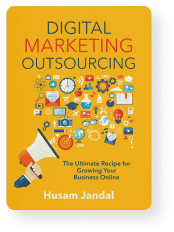
Understanding the disadvantages of outsourcing digital marketing can be quite challenging, especially when most discussions revolve around its benefits. As a digital marketing consultant, I talk about the pros of digital marketing outsourcing quite a bit too, but I’m actually not a proponent of it across the board. Give me a few minutes and I’ll go over some of the challenges, when outsourcing may be appropriate, and how you can have more success if you do choose to outsource.
What is Outsourcing in Digital Marketing?
When you decide to outsource digital marketing, it means entrusting third-party experts like a digital marketing agency or a freelancer with your marketing efforts in roles such as:
- Analytics
- Copywriting
- Development
- Digital Marketing Management
- Email Marketing
- Graphic Design and Creative Work
- Pay-Per-Click (PPC) Ad Management
- Search Engine Optimization (SEO)
- Social Media Marketing
- Video Production
Why Do Companies Choose to Outsource Digital Marketing?
Around half of all B2B companies outsource at least some of their marketing, according to Statista. By outsourcing, you can bring on a team of experts, scale without losing focus on your business, improve results, and reduce costs, freeing up time and resources to focus on your core business goals.
How is Digital Marketing Outsourced?
Oftentimes, digital marketing is outsourced to a freelancer or an agency. The experience is different depending on the route you choose. You’ll generally pay less to work with freelancers, but you’ll need to manage the projects more. Digital marketing agencies require less oversight but cost more, and you’re more likely to wind up with a cookie-cutter approach to your digital marketing.
I give brands the best of all worlds as a digital marketing consultant because I work with in-house and outsourced professionals depending on the situation, the available talent, the role, and other factors.
What are the Disadvantages of Outsourcing Digital Marketing?
While outsourcing may have several benefits, there are some disadvantages to digital marketing outsourcing. These include a lack of brand consistency, scheduling conflicts, and the potential for unexpected costs. I will go over a few below:

1. Outsourced Talent Has Less Company and Culture Exposure
One of the best things about keeping your marketing in-house is that the team gets to know your business and customers inside and out. In contrast, freelancers and digital marketing agencies, due to their split attention across various projects, might not establish the same depth of connection with your business. Allow me to provide a few examples.
- A freelancer handling your marketing efforts, such as analytics, might deliver results without having an in-depth knowledge of your business.
- An agency manages your PPC marketing campaign and runs a company that makes specialized CRM and billing software for accountants. Because the agency doesn’t know your company or customers well, they don’t realize that a search for “accounting software” is usually a business looking to purchase software they can use versus an accountant looking for software their firm can use. In the end, you wind up needlessly spending thousands of dollars marketing to the wrong audience. This isn’t necessarily an issue of in-house vs outsourcing. Outsourced talent can perform the job, but you need someone with industry knowledge.
- When relying on a remote social media strategist, it’s important to consider their limitations in efficiently addressing queries compared to an in-house team with insider knowledge. Let’s say a freelancer is managing your social media and encounters a customer complaint about a product issue and a prospective customer inquiring about product features. Without access to internal information, the freelancer may provide incorrect answers or redirect the questions back to you for a response. Meanwhile, tensions mount as your social media queries wait. It’s technically possible to find a freelancer who can perform well, but because they’re removed from your company, you’re usually better off keeping the role in-house.
2. Brand Consistency May be Lacking
The issue of “too many cooks in the kitchen” might arise with digital marketing strategies when outsourced. Even when two people are given the exact same guidelines, they can produce radically different things. Your brand voice may sound different from one person to the next, colors may be different, shapes won’t match… the list goes on.
To keep branding consistent, you either need to keep certain roles in-house or provide creatives with a detailed style guide, templates, and other materials. Your results will be even better if your team collaborates and has dedicated asset sharing.
3. You Can’t Set Freelancer or Agency Schedules
The moment you start telling freelancers or agencies when they have to work, they stop being outsourced talent and become employees. In many cases, that may mean you’re responsible for offering them the same benefits as employees, and employee taxes start to apply. It can hurt the relationship too.
This loss of control can pose challenges when urgent marketing tasks or meetings are needed.
You can get around this disadvantage of outsourcing digital marketing by planning workloads, tasks, and meetings ahead of time. Using a good project management tool will help greatly with this. In addition, if you develop strong relationships with your extended team, they may volunteer to jump in for the occasional unexpected need too.
4. Costs Can Climb if Not Managed Well
Unexpected and hidden charges are one of the biggest disadvantages of outsourcing digital marketing. This can happen due to:
- Failure to Discuss Limits: It can be uncomfortable to discuss money and hours worked, but it’s essential to understand how much you’ll spend on tasks before your talent starts work.
- Miscommunications: Sometimes, business owners and talent have different ideas about what it takes to complete a project.
- Scope Creep: Maybe you started off thinking you wanted a website and then realized you wanted it optimized midway too, only to find that’s an extra charge. Or, maybe you asked for a ten-page site but then realized the site needed special functionality.
- Intentional Slowness: Unfortunately, some hourly talent will intentionally work slowly to increase their billable hours. This can happen with in-house talent, too, though.
- Upcharges: Particularly with agencies and specialty firms, you may find there are surprise upcharges. For example, you might look at sample blogs on a website and see the company is charging a low price for content, only to submit an order and find out there are additional charges if you want a subject matter expert, longer copy, editing, optimization, and so forth.
Regardless of who you’re outsourcing to, the only way to manage these issues is to have your agreement in writing, develop good relationships with talent, monitor results, and take corrective action if your extended team isn’t delivering on your cost expectations.
5. You’re Trusting “Outsiders” with Proprietary Data
One of the most worrisome disadvantages of outsourcing digital marketing is the potential security risk. It’s hard to know if you have the same level of loyalty as you do with in-house employees, and there will be times your team needs access to things like pre-market product info, customer data, and company numbers.
The reality is that these issues can creep up with in-house talent too. Errors may be made, or disgruntled employees may intentionally share info. Protecting proprietary data is handled much the same either way. Limit data sharing only to those who need to know. Have the team sign NDAs and similar agreements. When you’re sharing sensitive data, always remind people that it’s not public knowledge and needs to be kept confidential.
Outsource Your Digital Marketing without the Disadvantages
I’ve worked with organizations of all sizes, from Fortune 100 companies to small businesses, and I’ve seen them all have success with outsourcing. The key is knowing when to outsource and when to keep roles in-house, and structuring your online marketing strategies to navigate common pitfalls. That way, you still get cost savings, access specialized resources, improve your ROI, and fuel your business goals. For a more detailed discussion on how a hybrid approach might work for your business and align with your marketing goals, feel free to contact me for a complimentary consultation. With my digital marketing solutions, I can craft a personalized approach that ensures the efficiency of your digital marketing activities while safeguarding your company’s interests.




































































